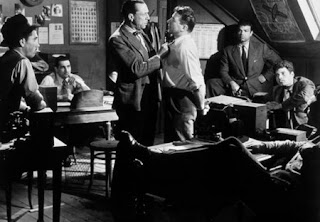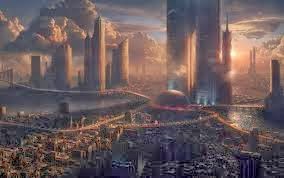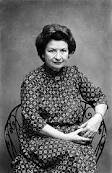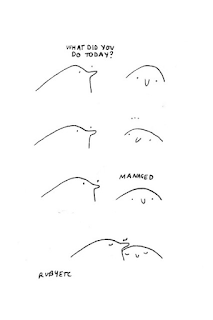Bookhound in novel land
I've just finished re-reading John Wyndham's The day of the Triffids. I'm not exactly going to re-review it, having reviewed it on here not that long ago, but a few thoughts on how I came to re-read it. Last week I had a meeting in London, afterwards I wandered across to the British Museum, and on the way back to Kings Cross Station (no, not to platform 9 3/4), I happened to pass the Senate House, University of London. Suddenly I had one of those moments that any book lover will recognise, but which was oddly disconcerting.
I'm sure you've experienced this too. You're happily driving down a road in Warwickshire, and realise that you're passing the spot where the hero of The writing on the hearth was ambushed, or you live just a few miles from where Lord Peter Wimsey nearly had a nasty accident. Although fiction (if it's any good) is always completely real to you when you're reading it, it's a strange, although not unpleasant feeling, when it meshes with your day-to-day-life. It suddenly becomes a lot more real, more immediate, even if, as was the case with the Cynthia Harnett novel, it was set in the remote past. This to me is not a huge problem as I tend to view much of the world through historically coloured glasses anyway. I wander round London in a bit of a haze gawping at Blue plaques, and feeling thrilled to wander in the footsteps of history.
So, why was the Senate House experience so disconcerting? Well, I've never crossed real life with an apocalyptic story before. When I realised where I was, I also realised that I was standing just about on the spot where Bill Masen had shot a triffid in the garden of the square; and just for a moment, I could have sworn that I saw one. This may have been partly exacerbated by the fact that the square happened to be oddly quiet at that moment, but still...
Of course after that, I had to re-read, and perhaps because of my closer to life experience prior to reading it, some strands stood out of the novel more this time than previously. Firstly I was amazed at Wyndham's accuracy re what might happen in the space race. Written 6 years before the launch of Sputnik, Wyndham had evidently been inspired by the writings of Arthur C. Clarke, and probably by the apparent interest of the US military in satellite technology. His thoughts on the possibilities of the military use of satellites, would seem not too unreasonable, and is I think, a concern, that is still current, if largely unspoken (mainly because there are plenty of issues to worry about here on earth without thinking any further).
The other area that really struck me was rather odder. As the characters in Triffids attempt to start life anew, a constant refrain is the difficulty of starting from scratch when humanity has become so far removed from the basics. If that was true in 1951, how much more true now.
Earlier in the week I had been giving a talk to undergrads about searching library catalogues. Due to an oddity in the system of the library where I work, a certain chunk of our collections are only available via a card catalogue. It's a problem because readers increasingly assume that if it isn't on a computer catalogue, it doesn't exist. The library in common with most libraries worldwide is moving to an increasingly electronic system, and before too long, there'll be no paper-trail, it'll all be online.
I wonder if it's a peculiarly generational thing, but I worry what if it all goes wrong - not just at work, but generally. What if we wake up one morning, and our electronics don't work anymore? How would we find anything without a paper trail? I know logically that this is not going to happen. It's too big, too much of the world depends on it. I would guess that we are as unlikely to lose our technology as we would have been to stop writing, once we had started and understood the benefits - and I bet at the time someone said "but it's so much better to pass it on orally, that way people are trained up immediately, you can help them if they don't understand something, it's not the same as being left alone with a piece of paper, perhaps with writing that you can't read on it" but, but, but that fear is still there.
I would suspect that it's partly a legacy of the Cold War, and partly the realisation that technology has changed immensely in such a short time. I don't think that people in their 20s fear that this may all disappear. It's comforting to think though that perhaps this is just how it has always been. In the first 50 years of my grandfather's life the Wright brothers flew for the first time, and the Spitfire was designed. He would live to see the moon landing, the space shuttle, and the space station. My mobile phone (which isn't a particularly brilliant one) has a better memory than the computer that took Apollo 11 to the moon and back.
Ultimately it's not about fearing technology, but more about recognising that humanity can make huge leaps. And sometimes can write so well that you can think you've seen an alien plant in a London garden....
I'm sure you've experienced this too. You're happily driving down a road in Warwickshire, and realise that you're passing the spot where the hero of The writing on the hearth was ambushed, or you live just a few miles from where Lord Peter Wimsey nearly had a nasty accident. Although fiction (if it's any good) is always completely real to you when you're reading it, it's a strange, although not unpleasant feeling, when it meshes with your day-to-day-life. It suddenly becomes a lot more real, more immediate, even if, as was the case with the Cynthia Harnett novel, it was set in the remote past. This to me is not a huge problem as I tend to view much of the world through historically coloured glasses anyway. I wander round London in a bit of a haze gawping at Blue plaques, and feeling thrilled to wander in the footsteps of history.
So, why was the Senate House experience so disconcerting? Well, I've never crossed real life with an apocalyptic story before. When I realised where I was, I also realised that I was standing just about on the spot where Bill Masen had shot a triffid in the garden of the square; and just for a moment, I could have sworn that I saw one. This may have been partly exacerbated by the fact that the square happened to be oddly quiet at that moment, but still...
Of course after that, I had to re-read, and perhaps because of my closer to life experience prior to reading it, some strands stood out of the novel more this time than previously. Firstly I was amazed at Wyndham's accuracy re what might happen in the space race. Written 6 years before the launch of Sputnik, Wyndham had evidently been inspired by the writings of Arthur C. Clarke, and probably by the apparent interest of the US military in satellite technology. His thoughts on the possibilities of the military use of satellites, would seem not too unreasonable, and is I think, a concern, that is still current, if largely unspoken (mainly because there are plenty of issues to worry about here on earth without thinking any further).
The other area that really struck me was rather odder. As the characters in Triffids attempt to start life anew, a constant refrain is the difficulty of starting from scratch when humanity has become so far removed from the basics. If that was true in 1951, how much more true now.
Earlier in the week I had been giving a talk to undergrads about searching library catalogues. Due to an oddity in the system of the library where I work, a certain chunk of our collections are only available via a card catalogue. It's a problem because readers increasingly assume that if it isn't on a computer catalogue, it doesn't exist. The library in common with most libraries worldwide is moving to an increasingly electronic system, and before too long, there'll be no paper-trail, it'll all be online.
I wonder if it's a peculiarly generational thing, but I worry what if it all goes wrong - not just at work, but generally. What if we wake up one morning, and our electronics don't work anymore? How would we find anything without a paper trail? I know logically that this is not going to happen. It's too big, too much of the world depends on it. I would guess that we are as unlikely to lose our technology as we would have been to stop writing, once we had started and understood the benefits - and I bet at the time someone said "but it's so much better to pass it on orally, that way people are trained up immediately, you can help them if they don't understand something, it's not the same as being left alone with a piece of paper, perhaps with writing that you can't read on it" but, but, but that fear is still there.
I would suspect that it's partly a legacy of the Cold War, and partly the realisation that technology has changed immensely in such a short time. I don't think that people in their 20s fear that this may all disappear. It's comforting to think though that perhaps this is just how it has always been. In the first 50 years of my grandfather's life the Wright brothers flew for the first time, and the Spitfire was designed. He would live to see the moon landing, the space shuttle, and the space station. My mobile phone (which isn't a particularly brilliant one) has a better memory than the computer that took Apollo 11 to the moon and back.
Ultimately it's not about fearing technology, but more about recognising that humanity can make huge leaps. And sometimes can write so well that you can think you've seen an alien plant in a London garden....










Comments